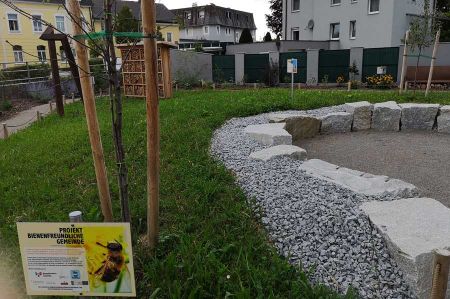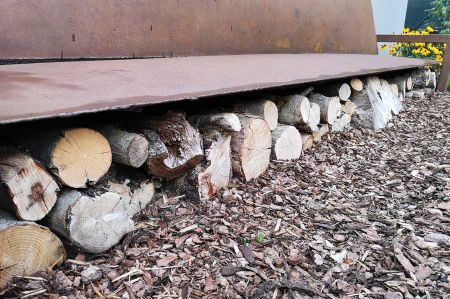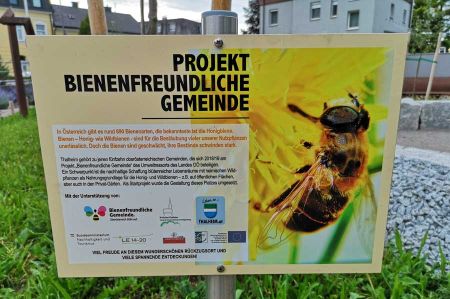Thalheim - Project of a Bee friendly community
- Written by Portal Editor
First, it was just a short view of a corner lot on busy street in Thalheim near Wels, almost directly on the banks of the river Traun.
A second view was necessary because the brain probably did not want to believe what the eye had just forwarded as information: a remnant property is provided in the sense of a generous bee hotel with infrastructure and adapted to bee life! Of course, the small bee hotels for your own home garden are not only a hundredfold in use, they are also found in urban gardens. Lift your cap when looking at this in Thalheim, an example to imitate.
New for us, the complete plant of a bee-friendly garden with plants, deadwood areas, explanatory panels and rest area for humans and animals, was completely unknown to us in the complexity to be seen over here. No doubt about it: pollination of plants is extremely important for humans and the environment, as about 70 percent of the world's 150 most important crops have benefited, according to experts. And clearly also that bee or insect death affects us all and is more than evil, because still the policy does not recognize that agriculture has to adapt to the actual needs of the people and not only to the profit motive of the agricultural industry. It is a shame when, just before the change from the Office of the Minister of Agriculture, a "weedkiller" that has been known for many years, gets its livelihood extended, so to speak, using the back door.
Bees and other pollinators of existential importance
 Bees are by no means the only pollinators. Flies, wasps, beetles, butterflies and moths also carry pollen from flower to flower. Of course, not all bee species are at the same time under threat of extinction. Again and again, it is suggested in the debate about bee mortality that it is all about honey bees. The problem is that honeybees are far less endangered because they are livestock, kept in beehives by people, and taken care of. Here it is rather: If the interest and the profit sinks, the number of the bee sinks.
Bees are by no means the only pollinators. Flies, wasps, beetles, butterflies and moths also carry pollen from flower to flower. Of course, not all bee species are at the same time under threat of extinction. Again and again, it is suggested in the debate about bee mortality that it is all about honey bees. The problem is that honeybees are far less endangered because they are livestock, kept in beehives by people, and taken care of. Here it is rather: If the interest and the profit sinks, the number of the bee sinks.
"The honeybee will be the last insect to die out," Peter Rosenkranz, head of the Landesanstalt für Bee Science at the University of Hohenheim, once told ZEIT Magazin. "It is not threatened as long as there are beekeepers."
Threatened are many wild bees that hardly anyone knows
 Annoying is the misunderstanding, because it pushes the real problem into the background. In fact, many wild bee species are threatened. They live alone in “wild” regions, are little known to many people and still extremely important pollinators. In Austria, there are about 690 species, just one of which is the honey bee, which is very vividly read on the boards. According to the International Conservation Union, about every tenth species of wild bee in Europe is threatened with extinction. More than half of the species do not even have reliable data on the stocks.
Annoying is the misunderstanding, because it pushes the real problem into the background. In fact, many wild bee species are threatened. They live alone in “wild” regions, are little known to many people and still extremely important pollinators. In Austria, there are about 690 species, just one of which is the honey bee, which is very vividly read on the boards. According to the International Conservation Union, about every tenth species of wild bee in Europe is threatened with extinction. More than half of the species do not even have reliable data on the stocks.
In addition, the number of - partly pollinating - insects declines overall. The exact extent of insect killing is not known because the stock has been documented only in isolated cases over long periods of time. There is also disagreement about the reasons. Researchers believe that large fields and monocultures in agriculture as well as dwindling habitat play a major role in the spread of cities.
Monocultures in large-scale cultivation and pesticides as the cause?
 Environmentalists call again and again individual pesticides such as glyphosate as the cause of dwindling and are often dismissed as a green donkey. Because actually the agent is not aimed at insects, but at plants, because it is used for weed control. Weed, what's that? And is not the "weed" with its variety of flowers also a food source in the life of insects?
Environmentalists call again and again individual pesticides such as glyphosate as the cause of dwindling and are often dismissed as a green donkey. Because actually the agent is not aimed at insects, but at plants, because it is used for weed control. Weed, what's that? And is not the "weed" with its variety of flowers also a food source in the life of insects?
Regardless of policy measures, which are mostly for economic interests only, private individuals can make life easier for bees, for example by not being too careful with gardening. A colorful flower meadow instead of English lawn can deliver pollen to bees from spring to autumn. Wild bees also need holes in branches or caves in the ground to build nests. An insect hotel can offer you retreat opportunities, as shown here in the project of the city Thalbach, very memorable.
Once again hats off, dear community Thalheim! To obey a whole property for the bees and insects without the profit greed (sale of the property). Certainly it was not to sacrifice a property for profit. But thanks for that.
Please read as well:
Impressions from Wels - Bike Order Days
Wels - a walk along the Traun river
-
 Thalheim - Bee friendly community offers space
Thalheim - Bee friendly community offers space
Thalheim - Bee friendly community offers space
Thalheim - Bee friendly community offers space
-
 Thalheim - Bee friendly community offers space
Thalheim - Bee friendly community offers space
Thalheim - Bee friendly community offers space
Thalheim - Bee friendly community offers space
-
 Thalheim - Bee friendly community offers space
Thalheim - Bee friendly community offers space
Thalheim - Bee friendly community offers space
Thalheim - Bee friendly community offers space
-
 Thalheim - Bee friendly community offers space
Thalheim - Bee friendly community offers space
Thalheim - Bee friendly community offers space
Thalheim - Bee friendly community offers space
-
 Thalheim - Bee friendly community offers space
Thalheim - Bee friendly community offers space
Thalheim - Bee friendly community offers space
Thalheim - Bee friendly community offers space
-
 Thalheim - Bee friendly community offers space
Thalheim - Bee friendly community offers space
Thalheim - Bee friendly community offers space
Thalheim - Bee friendly community offers space
-
 Thalheim - Bee friendly community offers space
Thalheim - Bee friendly community offers space
Thalheim - Bee friendly community offers space
Thalheim - Bee friendly community offers space
-
 Thalheim - Bee friendly community offers space
Thalheim - Bee friendly community offers space
Thalheim - Bee friendly community offers space
Thalheim - Bee friendly community offers space
-
 Thalheim - Bee friendly community offers space
Thalheim - Bee friendly community offers space
Thalheim - Bee friendly community offers space
Thalheim - Bee friendly community offers space
-
 Thalheim - Bee friendly community offers space
Thalheim - Bee friendly community offers space
Thalheim - Bee friendly community offers space
Thalheim - Bee friendly community offers space
-
 Thalheim - Bee friendly community offers space
Thalheim - Bee friendly community offers space
Thalheim - Bee friendly community offers space
Thalheim - Bee friendly community offers space
-
 Thalheim - Bee friendly community offers space
Thalheim - Bee friendly community offers space
Thalheim - Bee friendly community offers space
Thalheim - Bee friendly community offers space
-
 Thalheim - Bee friendly community offers space
Thalheim - Bee friendly community offers space
Thalheim - Bee friendly community offers space
Thalheim - Bee friendly community offers space
-
 Thalheim - Bee friendly community offers space
Thalheim - Bee friendly community offers space
Thalheim - Bee friendly community offers space
Thalheim - Bee friendly community offers space
-
 Thalheim - Bee friendly community offers space
Thalheim - Bee friendly community offers space
Thalheim - Bee friendly community offers space
Thalheim - Bee friendly community offers space
https://www.alaturka.info/en/life/fauna/4904-thalheim-project-of-a-bee-friendly-community#sigProId85becf7123

